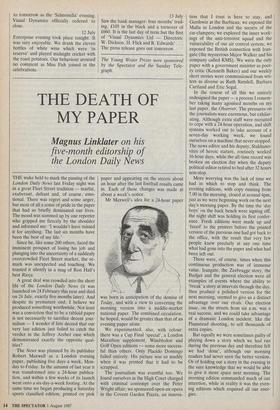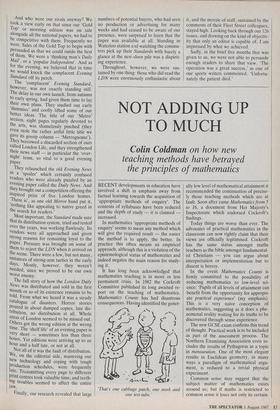THE DEATH OF MY PAPER
Magnus Linklater on his
five-month editorship of the London Daily News
THE wake held to mark the passing of the London Daily News last Friday night was in a great Fleet Street tradition — tearful, exuberant, defiant and, of course, emo- tional. There was regret and some anger, but most of all a sense of pride in the paper that had so briefly dominated our lives. The mood was summed up by one reporter who gripped me fiercely by the shoulder and informed me: '1 wouldn't have missed it for anything. The last six months have been the best of my life.'
Since he, like some 200 others, faced the imminent prospect of losing his job and plunging into the uncertainty of a suddenly overcrowded Fleet Street market, the re- mark was unexpected and touching. We toasted it silently in a mug of Ron Hall's best Rioja.
A great deal was crowded into the short life of the London Daily News (it was launched on 24 February this year and died on 24 July, exactly five months later). And despite its premature end, I believe we produced something worthwhile. Not least was a conviction that to be a tabloid paper is not necessarily to sacrifice decent jour- nalism — I wonder if fate decred that our very last edition just failed to catch the verdict in the Jeffrey Archer case which demonstrated exactly the opposite qual- ities?
The News was planned by its publisher Robert Maxwell as a London evening paper, publishing five days a week, Mon- day to Friday. In the autumn of last year it was transformed into a 24-hour publica- tion, and within a few weeks of its launch went onto a six-day-a-week footing. At the same time we began producing a Saturday sports classified edition, printed on pink paper and appearing on the streets about an hour after the last football results came in. Each of these changes was made at about a week's notice.
Mr Maxwell's idea for a 24-hour paper was born in anticipation of the demise of Today, and with a view to converting the morning version into a middle-market national paper. The combined circulation, he hoped, would be greater than that of an evening paper alone.
We experimented, also, with colour: there was a Cup Final 'special', a London Marathon supplement, Wimbledon and Golf Open editions — some more success- ful than others. Only Placido Domingo failed entirely. His picture was so muddy when it was printed that it had to be scrapped.
The journalism was eventful too. We found ourselves in the High Court charged with criminal contempt over the Peter Wright affair; we sponsored open-air opera in the Covent Garden Piazza, an innova- tion that I trust is here to stay, and Gershwin at the Barbican; we exposed the Mafia in London and the secrets of the car-dampers; we explored the inner work- ings of the anti-terrorist squad and the vulnerability of our air control system; we exposed the British connection with Iran- gate (the mysterious Major Walker and his company called KMS). We were the only paper with a government minister as poet- ry critic (Kenneth Baker) and our weekly short stories were commissioned from wri- ters as diverse as Ruth Rendell, Barbara Cartland and Eric Segal.
In the course of all this we entirely redesigned the paper — a process I remem- ber taking many agonised months on my last paper, the Observer. The pressures on the journalists were enormous, but exhilar- ating. Although extra staff were recruited to cope with a 24-hour operation, and shift systems worked out to take account of a seven-day working week, we found ourselves on a machine that never stopped.
The news editor and his deputy, Stakhano- vites of heroic stature, routinely worked 16-hour days, while the all-time record was broken on election day when the deputy political editor retired to bed after 32 hours non-stop.
More worrying was the lack of time we had in which to stop and think. The evening editions, with copy running from 7.00 in the morning, closed at around 4pm, just as we were beginning work on the next day's morning paper. By the time the 'day boys' on the back bench were signing off, the night shift was holding its first confer- ence. Fresh editions were made up and `faxed' to the printers before the printed version of the previous one had got back to the office, with the result that very few people knew precisely at any one time what had gone into the paper and what had been left out.
There were, of course, times when this continuous production was of immense value. Irangate, the Zeebrugge story, the Budget and the general election were all examples of events where the ability to `break' a story at intervals through the day, then produce a polished version for the next morning, seemed to give us a distinct advantage over our rivals. Our election issue, on the streets from six a.m. was a real success, and we could take advantage of a dramatic London incident, like the Plumstead shooting, to sell thousands of extra copies.
But equally we were sometimes guilty of playing down a story which we had run during the previous day and therefore felt we had 'done', although our morning readers had never seen the better version.
Or of holding out a story in the evening in the sure knowledge that we would be able to give it more space next morning. The morning edition commanded much of our attention, while in reality it was the even- ing editions which required all our ener- gies. And who were our rivals anyway? We took a view early on that since our 'Gold Top' or morning edition was on sale alongside all the national papers, we had to be competitive with them. Frequently we were. Sales of the Gold Top to begin with persuaded us that we could outdo the best of them. We were a 'thinking man's Daily Mail', or a 'popular Independent'. And as for the evening, we believed that in time we would knock the complacent Evening Standard off its perch. The 'complacent' Evening Standard, however, was not exactly standing still. The delay in our own launch, from autumn to early spring, had given them time to lay their own plans. They studied our early `dummies' and coolly lifted some of our better ideas. The title of our 'Metro' section, eight pages regularly devoted to the arts, was shamelessly pinched (they even stole the rather artful little title we gave its gossip column — `Metrognome'). They borrowed a discarded section of ours called London Life, and they strengthened their news staff — in particular the 'over- night' team, so vital to a good evening Paper.
They relaunched the old Evening News as a 'spoiler' which certainly confused readers who were already puzzled by an evening paper called the Daily News. And they brought out a competition offering the Inspired prize of five London homes. `There is', as one old Mirror hand put it, nothing like appealing to native greed in the search for readers.'
Most important, the Standard made sure that its distribution system, tried and tested over the years, was working flawlessly. Its vendors were all approached and given strong reasons for remaining loyal to the paper. Pressure was brought on some of them to reject the LDN when it arrived on the scene. There were a few, but not many, instances of strong-arm tactics in the early days. Mostly, however, they weren't needed, since we proved to be our own worst enemy. The full story of how the London Daily News was distributed and sold in the first month or so of its existence remains to be told. From what we heard it was a steady catalogue of disasters. Horror stories poured in about dumped copies, late dis- tribution, no distribution at all. Whole areas of London seemed to be missed out. Others got the wrong edition at the wrong time. The 'shelf life' of an evening paper is very short — sometimes less than three hours. Yet editions were arriving up to an hour and a half late, or not at all. Not all of it was the fault of distribution. We, on the editorial side, mastering our new technology and coping with tough production schedules, were frequently late. Transmitting every page to different print centres took valuable time, and teeth- ing troubles seemed to affect the entire Jaw.
Finally, our research revealed that large numbers of potential buyers, who had seen no production or advertising for many weeks and had ceased to be aware of our presence, were surprised to learn that the paper was available at all. Standing in Waterloo station aad watching the commu- ters pick up their Standards with barely a glance at the next-door pile was a dispirit- ing experience.
Throughout, however, we were sus- tained by one thing: those who did read the LDN were enormously enthusiastic about it, and the morale of staff, sustained by the comments of their Fleet Street colleagues, stayed high. Looking back through our 126 issues, and drawing on the kind of objectiv- ity that only an editor is capable of, I am impressed by what we achieved.
Sadly, in the brief five months that was given to us, we were not able to persuade enough readers to share that view. 'The operation was a great success,' as one of our sports writers commented. `Unfortu- nately the patient died.'



















































 Previous page
Previous page